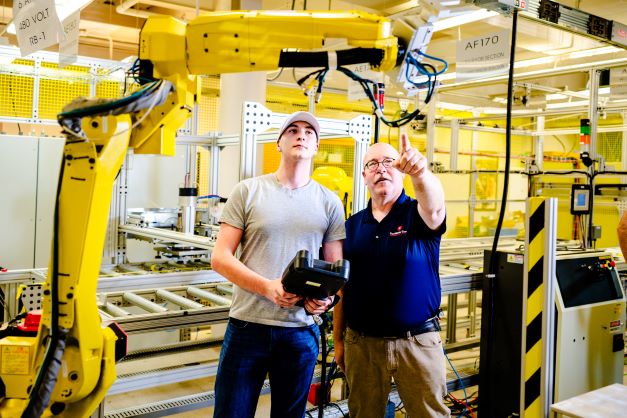Five ways community colleges are meeting workforce demands in North Carolina

Published: February 16, 2023
From surges in new and expanded businesses to post-pandemic recovery efforts, North Carolina industries have a booming demand for more workers – and community colleges are filling the need.
Technology, life sciences, and advanced manufacturing industries are a huge – and newsworthy — part of that growth as well as longtime high-demand needs for healthcare, first responders, and technical trades.
According to the N.C. Secretary of State Elaine Marshall, 171,400 new businesses were created in 2022 and 178,300 new businesses were created in 2021 – the two best years on record and continuing its trend in 2023.
In addition to the creation of new businesses, large companies and corporations are opening sites throughout the state, making North Carolina among the fastest growing states with many national analysts calling North Carolina the top state in the U.S. for business.
“Community colleges are the economic first responders of our state and we are building diverse talent pipelines across North Carolina that build workforces, create customized training and programs, and develop talent from within our communities,” said Dr. Bill Carver, Interim President of the North Carolina Community College System.
Here are five ways community colleges are contributing to The Tar Heel State’s growing workforce:
 Public Partnerships
Public Partnerships
As more business and industries come to North Carolina, the need for first responders increases to meet the growing population of the state. This need is also met by staffing shortages following the COVID-19 pandemic. Communities are confronting the need for 911 telecommunicators, law enforcement officers, and full-time firefighters — and community colleges are partnering with cities and agencies to fill critical jobs that keep our communities safe.
In Spring 2021, Durham Technical Community College announced a partnership with the City of Durham to open a 911 Academy, designed to train 911 dispatchers in just nine weeks. The first class of students graduated in July 2022. In November 2022, the State Board of Community Colleges approved Richmond Community College to offer a first-of-its-kind 911 Communication and Operations associate degree. The two-year program will help with staffing shortages and wand career advancement opportunities.
All 58 community colleges also offer fire, EMS, and law enforcement training that provide talent to local agencies.
 ApprenticeshipNC
ApprenticeshipNC
According to the U.S. Department of Labor, registered apprenticeships have grown 64 percent since 2012 and it’s no surprise why. Apprenticeships are incredible opportunities for students to engage with local employers through on-the-job training while earning a livable wage. On average, students are apprentices for one to three years, which also boosts their resumes.
All 58 community colleges in North Carolina offer apprenticeship programs, which are overseen by the statewide ApprenticeshipNC program. Participating companies range from Cisco Systems to Ace Electric to Wake Forest Baptist Health. In 2022, Atrium Health Wake Forest Baptist collaborated with Davidson-Davie Community College to create the very first nursing apprenticeship program in North Carolina.
Apprenticeships have proven to be successful for businesses with a 2021 analysis showing a 170- percent return on investment (ROI) for employers. ApprenticeshipNC has doubled its numbers in the state since being added to the North Carolina Community College System in 2017. Currently, there are 11,398 apprentices. Top industries include healthcare, energy, construction, and advanced manufacturing.
 Industry Partnerships
Industry Partnerships
For decades, community colleges have provided customized training to support every type of industry – helping employees master new technologies, learn new skills, keep up with business trends, and unlock their potential. In 2023, the North Carolina Community College System partnered with the North Carolina Office of Economic Development to launch NC Edge, the first state training program of its kind. Customized training is offered at all 58 community colleges. A few companies that have found their “edge” in North Carolina, include: Honda Aircraft Company, Lenovo, ThermoFisher Scientific, and Avadim Health.
Community colleges also partner with organization to build continuous and expanded programs that provide talent pipelines to companies across the state. Colleges partner with organizations like Duke Energy, who announced a significant need for more electric line technicians in 2018. Since then, Duke Energy has provided millions in funding to several community colleges in the state to train the next generation of line techs. Most recently, Duke Energy provided a $500,000 grant to Central Piedmont Community College to launch an Electric Line Technician Training Program in Spring 2023.
 Small Business Center Network
Small Business Center Network
It’s safe to say the Small Business Center Network (SBCN) played a significant role in the influx of new businesses in North Carolina in the last two years. The Network is housed within the North Carolina Community College System and comprised of Small Business Centers at all 58 community colleges. They each provide free, confidential business counseling, high-impact seminars and classes at no cost or nominal fees, unlimited resources, and a referral network to meet a variety of business needs. The SBCN is the state’s largest state-supported small business assistance initiative. The Network has fueled entrepreneurial dreams since 1984 and continues to grow its impact every year.
“When my husband and I approached the Sandhills Community College Small Business Center with our new business idea, they were encouraging but realistic and honest. They gave sound advice, referred us to resources that have now become valued business partners and have been a pillar of support ever since. I can honestly say that much of our set up for success has been as a result of our relationship with the Small Business Center,” said Tiffany Fleeman, owner of Workhorse Fitness and Yoga in Southern Pines, NC.
 High-Demand Programs
High-Demand Programs
All 58 community colleges offer high-demand courses that help students get opportunities for immediate employment in growing industries. Program advisors meet with business and industry leaders regularly to gain a better understanding of workforce needs. Healthcare, biotechnology, emerging technology, and construction trades are some of the industry sectors with high-demand needs.
Community colleges are developing accelerated courses and looking for opportunities to bridge short-term continuing education courses with traditional associate curriculum programs to streamline college credentials and get trained graduates working immediately.
Colleges across the state also are considering new formats to serve students, including 8-week courses that allow students to move more quickly through select classes. Students interested in scholarship or tuition-waiver opportunities for short-term courses should contact their local community college for options.
Learn more about the impact of North Carolina community colleges at yourhireeducation.com